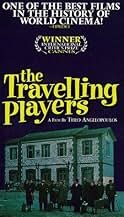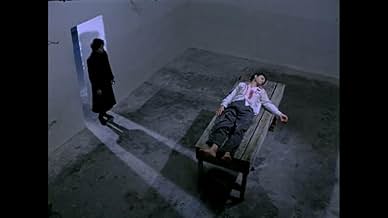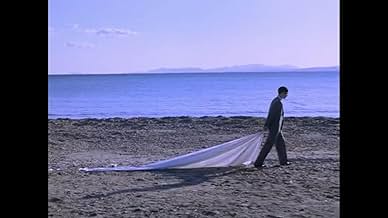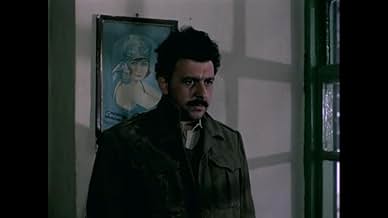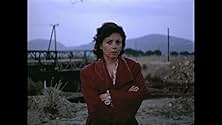VALUTAZIONE IMDb
7,8/10
4606
LA TUA VALUTAZIONE
Grecia, 1939-1952: la seconda guerra mondiale, l'occupazione italiana e tedesca e la guerra civile viste da una famiglia di attori itineranti.Grecia, 1939-1952: la seconda guerra mondiale, l'occupazione italiana e tedesca e la guerra civile viste da una famiglia di attori itineranti.Grecia, 1939-1952: la seconda guerra mondiale, l'occupazione italiana e tedesca e la guerra civile viste da una famiglia di attori itineranti.
- Regia
- Sceneggiatura
- Star
- Premi
- 12 vittorie e 2 candidature totali
Recensioni in evidenza
10iathanas
The Travelling Players is possibly the greatest movie in the history of Greek cinema. It is directed by the world-renowned Greek director Theo Angelopoulos and it presents the life in Greece from 1939 to 1952 through a family of travelling provincial players. It explores the political history of Greece during a very dramatic period, that includes dictatorship, the WWII outbreak, the Italian invasion and the subsequent German occupation and it continues with the liberation of the country and the very bloody Civil War.
The Travelling Players was a very controversial movie. The film was to participate officially in the Cannes Film Festival, but the conservative Greek government, sought (and failed) to prevent this to happen, because the film tells the modern Greek history through a left- Marxist perspective.
Angelopoulos proves that he's a master filmmaker on every level. From direction and writing to every technical aspect. Cinematography in particular.
Also, the music by Loukianos Kilaidonis is fantastic and elevates the film in a different level.
The Travelling Players is a masterpiece that everyone should watch.
The Travelling Players was a very controversial movie. The film was to participate officially in the Cannes Film Festival, but the conservative Greek government, sought (and failed) to prevent this to happen, because the film tells the modern Greek history through a left- Marxist perspective.
Angelopoulos proves that he's a master filmmaker on every level. From direction and writing to every technical aspect. Cinematography in particular.
Also, the music by Loukianos Kilaidonis is fantastic and elevates the film in a different level.
The Travelling Players is a masterpiece that everyone should watch.
"The Travelling Players", one of the early films of Theo Angelopoulos, shows the vast difference between the talented rising director of 1975 that had something to say, and of the bourgeois famous director of 1998 ("Eternity And A Day") that won the Cannes award but had nothing left to say.
A sprawling epic running at around 4 hours, the film follows a group of touring actors performing a theatrical play across Greece between 1939 and 1952. The focus is on the troubled modern history of Greece during the period (a fascist dictatorship, resistance against the Italians, German occupation, civil war), seen through a series of warped desolate sequences drenched in languor, and also an apotheosis of traditional folklore, music, theater, rural and urban landscapes. Most of these scenes exhibit a rare poetical sensibility, while a few are a bit clumsy, but still interesting.
Couple that with the drama that unfolds within the group of players, and you've got a true masterpiece. Basically what we see is a loose adaptation of Aeschylus' ancient tragedy "Oresteia" (the father Agamemnon, the adulterous mother Clytamnestra, her lover Aegisthus, the avenging daughter Elektra, the avenging son Orestes etc). In the end, the group of actors stands severely rearranged through a painful and dividing historical period, shadows of themselves in a shadow of a country. The film ends as a perfect circle just the way it began, a metaphor for life itself.
A sprawling epic running at around 4 hours, the film follows a group of touring actors performing a theatrical play across Greece between 1939 and 1952. The focus is on the troubled modern history of Greece during the period (a fascist dictatorship, resistance against the Italians, German occupation, civil war), seen through a series of warped desolate sequences drenched in languor, and also an apotheosis of traditional folklore, music, theater, rural and urban landscapes. Most of these scenes exhibit a rare poetical sensibility, while a few are a bit clumsy, but still interesting.
Couple that with the drama that unfolds within the group of players, and you've got a true masterpiece. Basically what we see is a loose adaptation of Aeschylus' ancient tragedy "Oresteia" (the father Agamemnon, the adulterous mother Clytamnestra, her lover Aegisthus, the avenging daughter Elektra, the avenging son Orestes etc). In the end, the group of actors stands severely rearranged through a painful and dividing historical period, shadows of themselves in a shadow of a country. The film ends as a perfect circle just the way it began, a metaphor for life itself.
This is the only film of Angelopoulos I really like, all those after it are just too much (or too little). It seems it is common practice for the best Greek films to be made under the harshest conditions - literary under fire! Thiasos is not an exception: it was made in about 2 years during the worst part of the military junta. Angelopoulos and his associates were planning to leave Greece on completion; during filming he would tell the police it was an action movie, a Greek western! Besides all that the core story derives from ancient Greek tragedy (Aeschylus, Sophocles, Euripides) and that is somewhat stunning.
This is a landmark film, a must see for anyone that wishes to understand modern Greek history and politics. The plot is a loose retelling of the Oresteia cycle of tragedies by Aeschylus--the names of the characters (Orestes, Electra, Chrysothemis) are an obvious hint. Betrayal, revenge and redemption are only part of the story. It takes place in Greece between 1936 and 1952, years filled with fascist dictatorship, war, Axis occupation, civil war and repression. Greece's traumatic history is seen through the eyes of a traveling company of actors, who travel all around provincial towns to perform a single play: "Golfo", a pastoral tragedy told in folk-song-inspired rhyming couplets.
This is not a movie for action-loving, short-attention-span viewers. Angelopoulos and his long-time collaborator, renowned cinematographer Arvanitis, have developed a very distinctive style, and "O Thiassos" is an uncompromising example. There are no close-ups, very little panning, some slow tracking; shots are long (both in point of view and time); almost every shot is filmed in overcast conditions; actors are dwarfed by their surroundings, which are all unglamorous, even depressing in their wartime run-down look. One could say that the purpose is to accentuate the tragic, the sense that the characters are cogs in the machine of history; but ancient tragedy did the same in big style, opulent costumes, and terrifying masks. Angelopoulos' politics induces him to focus on ordinary people in ordinary surroundings instead. The result is strangely, hauntingly lyrical to many; a real downer for some.
The film came out in 1975, a year after the end of the dictatorial right-wing regime of the "colonels" (1967-74), and after decades of repression of communists and their sympathisers. Angelopoulos' point of view is sympathetic to the left/communist side. Under full democracy, it was finally allowed to be expressed. The film helped shape the political sensibilities of a whole generation of Greek baby boomers. Its sixteen-year trek (plod, some would say) through Greek history will probably bewilder non-Greek viewers, but it is a deeply affecting crash-course in what shaped contemporary Greece. It is also an impressive re-interpretation of tragedy, as original as any I have seen on film.
This is not a movie for action-loving, short-attention-span viewers. Angelopoulos and his long-time collaborator, renowned cinematographer Arvanitis, have developed a very distinctive style, and "O Thiassos" is an uncompromising example. There are no close-ups, very little panning, some slow tracking; shots are long (both in point of view and time); almost every shot is filmed in overcast conditions; actors are dwarfed by their surroundings, which are all unglamorous, even depressing in their wartime run-down look. One could say that the purpose is to accentuate the tragic, the sense that the characters are cogs in the machine of history; but ancient tragedy did the same in big style, opulent costumes, and terrifying masks. Angelopoulos' politics induces him to focus on ordinary people in ordinary surroundings instead. The result is strangely, hauntingly lyrical to many; a real downer for some.
The film came out in 1975, a year after the end of the dictatorial right-wing regime of the "colonels" (1967-74), and after decades of repression of communists and their sympathisers. Angelopoulos' point of view is sympathetic to the left/communist side. Under full democracy, it was finally allowed to be expressed. The film helped shape the political sensibilities of a whole generation of Greek baby boomers. Its sixteen-year trek (plod, some would say) through Greek history will probably bewilder non-Greek viewers, but it is a deeply affecting crash-course in what shaped contemporary Greece. It is also an impressive re-interpretation of tragedy, as original as any I have seen on film.
Theo Angelopoulos is one of the acknowledged masters of cinema, and yet he remains little seen: an acquired taste. It is easy to see why. Unlike other greats, like, say, Renoir and Mizoguchi, who, though firmly rooted in their own national cultures, present characters and narratives generally recognisable, Angelopoulos is forbiddingly national (as opposed to nationalistic: there are echoes of everyone from Fellini to Bunuel to Ozu in this film) in his outlook. Watching this film without any knowledge of Greek history, literature or mythology can be very frustrating - every time you see a character, event, composition, you know it alludes to something else, but because you don't know what, you feel like you're missing the point of the film. La Regle Du Jeu is enriched by a deep knowledge of French History, but can be enjoyed by anyone with an interest in cinema, stories or humanity. Angelopoulos' films don't have this surface level of entertainment - everything is symbolic and loaded.
Does this mean that the only enjoyment of the film can be a cold admiration of form? No. Even if we don't understand the specifics, we can recognise the horrors of a nation beset by continual tyranny. The metaphor of a theatrical troupe, travelling throughout Greece, is subtly used. Rather than actors, or commentators on history, as we'd expect, they're always continually observing, on the margins. Modern Greece is a labyrinth - the film is dense with streets, corridors, doors, offering no escape, just an endless loop, leading to dead ends of time and space. Fascism has exploded these notions in its denying of history and its attempt to homogenise space, and the same frame can hold events decades apart.
The travelling players are exiles in their own country. Like Bunuel's discreet diners, they can never finish their play: when they do it results in death, stagnation, and a break up of the troupe. They're bewildered like Pirandello's Six Characters, not necessarily searching for an author (they have one - Greek history), but trying to escape him. The great irony is that they cannot remain untainted by the times - one's son is a partisan, another is an informer.
Angelopoulos' use of the medium really does inspire awe. His slow, long takes, long-shot compositions and camera movements, open the mind to new conceptions of time and space, forbidden by the ideologies ruling Greece. The film is full of remarkable, shocking set-pieces; austere quiet bursting into Fellini-esque disruption; revels and song turning into murder and horror; editing so spare that each cut becomes a jolt. Songs, birds and water are the driving metaphors here: how fascism appropriates our minds, imagination and especially our voice; how our reaching for freedom is always curtailed; how history is a never-changing trampling on the vulnerable.
Angelopoulos is a modernist - he still believes in the power of witness, and the ability to assert truth, which is refreshing in these times where irony is confused with indifference. Compare THE TRAVELLING PLAYERS with Nabokov's Bend Sinister, similarly concerned with artists in a totalitarian system. Angelopoulos' systematic attempt to shore fragments against the ruins is denied by Nabokov, who bleakly suggests through fragmentation, distortion and disrupton that there is no shoring, that the only plausible rebellion is madness. Angelopoulos' view is, in many ways, more reassuring.
The film is not without its problems - a raped woman stands up to recite the rape of Greece in a queasy monologue; hateful royalists are coded homosexual to suggest sterility and death; there is, at times, a humourless self-righteousness and portentousness to the film that grates. But, before he slipped into the vague artiness of his later works, its astonishing to think that people could make films like this. In the way that you may not hold Finnegan's Wake or the Sistine Chapel to your heart, THE TRAVELLING PLAYERS is unloveable, but it's a rare experience in the cinema of the sublime. (And, believe me, once you've attuned yourself to Angelopoulos' rhythm, you won't want those four hours to end)
Does this mean that the only enjoyment of the film can be a cold admiration of form? No. Even if we don't understand the specifics, we can recognise the horrors of a nation beset by continual tyranny. The metaphor of a theatrical troupe, travelling throughout Greece, is subtly used. Rather than actors, or commentators on history, as we'd expect, they're always continually observing, on the margins. Modern Greece is a labyrinth - the film is dense with streets, corridors, doors, offering no escape, just an endless loop, leading to dead ends of time and space. Fascism has exploded these notions in its denying of history and its attempt to homogenise space, and the same frame can hold events decades apart.
The travelling players are exiles in their own country. Like Bunuel's discreet diners, they can never finish their play: when they do it results in death, stagnation, and a break up of the troupe. They're bewildered like Pirandello's Six Characters, not necessarily searching for an author (they have one - Greek history), but trying to escape him. The great irony is that they cannot remain untainted by the times - one's son is a partisan, another is an informer.
Angelopoulos' use of the medium really does inspire awe. His slow, long takes, long-shot compositions and camera movements, open the mind to new conceptions of time and space, forbidden by the ideologies ruling Greece. The film is full of remarkable, shocking set-pieces; austere quiet bursting into Fellini-esque disruption; revels and song turning into murder and horror; editing so spare that each cut becomes a jolt. Songs, birds and water are the driving metaphors here: how fascism appropriates our minds, imagination and especially our voice; how our reaching for freedom is always curtailed; how history is a never-changing trampling on the vulnerable.
Angelopoulos is a modernist - he still believes in the power of witness, and the ability to assert truth, which is refreshing in these times where irony is confused with indifference. Compare THE TRAVELLING PLAYERS with Nabokov's Bend Sinister, similarly concerned with artists in a totalitarian system. Angelopoulos' systematic attempt to shore fragments against the ruins is denied by Nabokov, who bleakly suggests through fragmentation, distortion and disrupton that there is no shoring, that the only plausible rebellion is madness. Angelopoulos' view is, in many ways, more reassuring.
The film is not without its problems - a raped woman stands up to recite the rape of Greece in a queasy monologue; hateful royalists are coded homosexual to suggest sterility and death; there is, at times, a humourless self-righteousness and portentousness to the film that grates. But, before he slipped into the vague artiness of his later works, its astonishing to think that people could make films like this. In the way that you may not hold Finnegan's Wake or the Sistine Chapel to your heart, THE TRAVELLING PLAYERS is unloveable, but it's a rare experience in the cinema of the sublime. (And, believe me, once you've attuned yourself to Angelopoulos' rhythm, you won't want those four hours to end)
Lo sapevi?
- QuizThe whole film is accomplished in around 80 shots.
- Citazioni
Elektra's Father: [before he is executed by the Germans] I came cross the sea, from Ionia. Where did you come from?
I più visti
Accedi per valutare e creare un elenco di titoli salvati per ottenere consigli personalizzati
- How long is The Travelling Players?Powered by Alexa
Dettagli
Contribuisci a questa pagina
Suggerisci una modifica o aggiungi i contenuti mancanti



